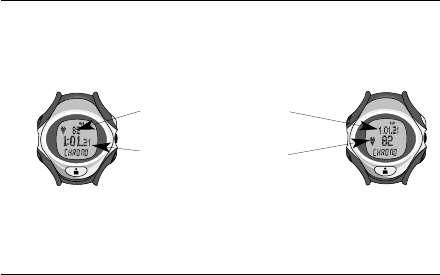
1716
The booklet Heart Zones® Tools For Success included in your Watch
packaging provides excellent procedures and Timex® recommends
you use one of these methodologies. However, if you cannot use any
of the procedures described in Heart Zones Tools for Success, you
might consider using the widely used, though highly debated, age-
based method. Begin with the number 220 and then subtract your
age. For instance, a 35 year old would begin with 220 and subtract
35 (the person’s age) which gives an estimated maximum heart rate
of 185.
Setting your Watch for first use
Once you determine your heart rate, set the following parameters
prior to using your Watch:
1. Set the time of day. For detailed information on Time of Day Mode,
including instructions for setting time of day, refer to page 20.
2. Enter your maximum heart rate. In Configure Mode, select
HRM SETTINGS and then MAX HR. Your maximum heart rate
setting determines your five preset heart rate target zones. For more
information refer to “Max heart rate” on page 58.
3. Select your desired heart rate display units. In Configure Mode,
select HRM SETTINGS and then HRM DISPLAY. Your Watch gives
you the option to view your heart rate in beats per minute (BPM) or
as a percentage of your maximum heart rate (PERCENT). For more
information refer to “Heart rate display” on page 58.
Display formatting
In Chronograph Mode, you can press and release SET/FORMAT
to switch the data values displayed in the upper and middle display
lines. This allows you to display the value most important to you in
the larger, middle display.
Switching the display formatting does not apply to ascent rate
which always appears in the middle line of the display. For more
information on ascent rate, see “Vertical Mode” on page 29.
Preparing to use your Watch
Determining your heart rate
In addition to many other useful features, your Watch uses
technology that helps you track detailed information about your
heart rate. But, before you can track this information, you first
need to determine your maximum heart rate. You can use many
methods to estimate your maximum heart rate.
Time
Heart Rate
Time
Heart Rate


















